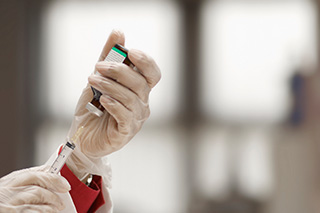As patients with cancer are at an increased risk of developing severe illness from SARS-CoV-2 infection and have high risk of mortality,1 vaccination of this group is important. Cancer patients who are currently undergoing therapy, planning therapy, or are in the first 6 months following treatment are considered a high priority group by the Centers for Disease Control and Prevention (CDC). Recently the National Comprehensive Cancer Network (NCCN) released preliminary guidelines for COVID-19 vaccination in patients with cancer. These recommendations are based on the expert opinions of the NCCN panel as there is no available data on vaccine administration in patients with cancer undergoing treatment.
NCCN Guidelines
The NCCN recommends that patients undergoing hematopoietic cell transplant (HCT) or cellular therapy (eg, chimeric antigen receptor T-cell [CAR-T] therapy) delay vaccination until 3 months following transplant or cellular therapy. These patients may be on immunosuppressive medications that may decrease the ability of the immune system to mount an effective response from the vaccine.2
The panel recommended that patients with hematologic malignancies on maintenance therapy, or with marrow failure from their disease or treatment without expectation to improve, should receive vaccination when it becomes available to them. Patients with hematologic malignancy who are undergoing intensive chemotherapy regimens should be vaccinated after absolute neutrophil (ANC) recovery.2
Those with solid tumor malignancies who are being treated with cytotoxic chemotherapy, targeted therapy, immunotherapy, checkpoint inhibitors, and/or radiation should receive the vaccine at any time it becomes available to them. As neutropenic periods from chemotherapy for solid tumors are short, ANC nadir does not need to be considered for vaccination. The NCCN states that with varying chemotherapy regimens, whether the vaccine is more effective at one point than another is unclear, and recommend patients get vaccinated when the vaccine is available.
A theoretical risk of immune-related adverse events exists for patients on immunotherapy. No data on timing vaccine receipt in relation to infusion is available; recommendations are for these patients to receive the vaccine when it is available. Vaccine-related symptoms, such as a fever, can be mistakenly attributed to a surgical complication; therefore, patients undergoing surgery for solid tumor malignancy should be vaccinated a few days before or after surgery. A longer waiting period may be warranted following surgery such as splenectomy or where immunosuppression may develop.2
Caregivers or close household contacts older than 16 years should receive the vaccine when it becomes available for them. Following vaccination, mask wearing, social distancing, and other illness prevention measures are still essential practices, as whether transmission of the virus is prevented by vaccination is still unknown.2
Ensuring that vaccines are equally available to all qualifying patients is vital. This includes minority groups, patients with lower socioeconomic status, and those without the ability to use health technology (eg, no access to electronic health portals). With limited access to healthcare resources, these groups are known to be at higher risk of developing COVID-19 complications.2
Until vaccines become widely available, prioritizing vaccination among patients with cancer may be needed. Those older than 65 or with comorbidities (such as diabetes, lung disease, or heart disease) should be a priority. Patients who are currently receiving active therapy should be prioritized over patients who are without evidence of disease following previous therapy. The NCCN panel could not provide specific recommendations for prioritization based on types of therapy given (chemotherapy, immunotherapy, targeted therapy, surgery, or radiation). Patients who were on hormonal therapy alone were considered a low priority for vaccination. Guidelines for prioritization of hematologic vs solid tumor malignancies also could not be provided. Vaccination against COVID-19 should be prioritized over other vaccines, as the COVID-19 vaccine should not be administered within 14 days of other vaccines.2
The panel also recommended updating clinical trial protocols to allow COVID-19 vaccination during the trial to prevent patients from having to forgo vaccination while enrolled.2
Patient Education
Patients’ safety concerns regarding vaccination while undergoing anticancer therapy are an important part of the discussion on COVID-19. Education should include information on how mRNA vaccines work, that they do not contain a live virus, and that no major safety concerns were identified.
Although the efficacy of the vaccine in patients with suppressed immune systems is currently unknown, the risks associated with becoming infected with this coronavirus may outweigh the risk of decreased vaccine response in this population. Continued vigilance of infection prevention via wearing a mask and maintaining social distance as appropriate remains essential, even after vaccination.2
References
- Kuderer NM, Choueiri TK, Shah DP, et al; COVID-19 and Cancer Consortium. Clinical impact of COVID-19 on patients with cancer (CCC19): a cohort study. Lancet. 2020;395(10241):1907-1918. doi:10.1016/S0140-6736(20)31187-9
- National Comprehensive Cancer Network (NCCN). Preliminary recommendations of the NCCN COVID-19 vaccination advisory committee. Version 1.0. Published January 22, 2021. Accessed March 2, 2021. https://www.nccn.org/covid-19/pdf/COVID-19_Vaccination_Guidance_V1.0.pdf
